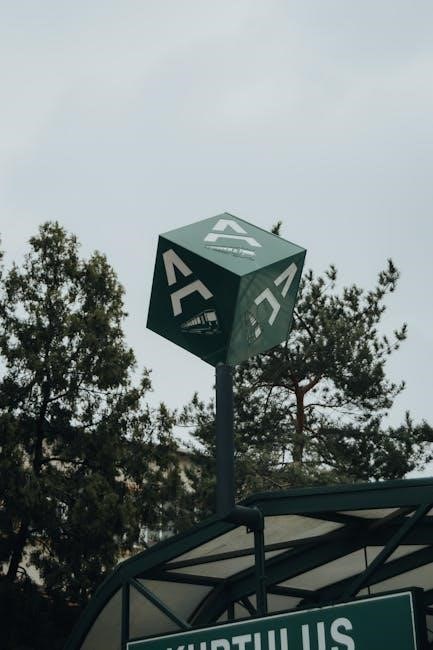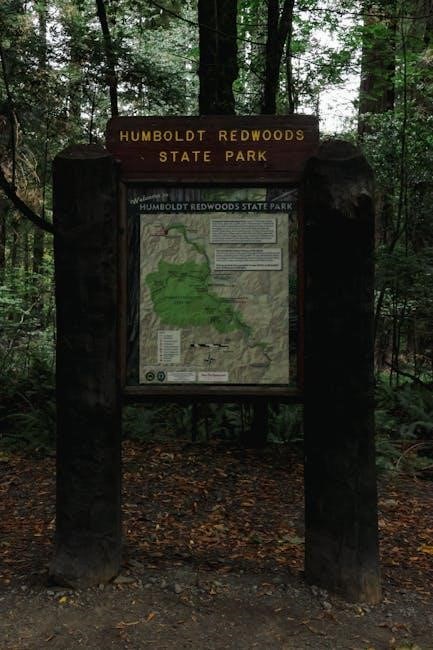The Delta Green Handler’s Guide is an essential resource for Game Moderators, offering insights into Lovecraftian horrors, covert operations, and scenario crafting to create immersive experiences.
Overview of the Delta Green RPG
Delta Green: The Roleplaying Game is a Lovecraftian horror RPG where players take on the roles of agents fighting against unnatural threats. Set in the modern day, it blends espionage, conspiracy, and cosmic horror, drawing inspiration from the Call of Cthulhu universe. The game emphasizes investigative gameplay, using the GUMSHOE system to handle skill checks and resource management. Agents operate in secrecy, facing unimaginable horrors while dealing with the psychological strain of their missions. The RPG is known for its grim tone, high stakes, and the sacrifices agents must make to protect humanity from forces beyond understanding.
Structure and Content of the Handler’s Guide
The Delta Green Handler’s Guide is a comprehensive 370-page resource designed for Game Moderators. It includes detailed metaplot information, setting descriptions, and extensive lore about Lovecraftian entities and other unnatural threats. The guide provides dossiers of major NPCs, rituals, and tomes, along with advice for crafting scenarios and managing player sanity. It also offers tips for building tension and atmosphere, ensuring a gripping experience; The content is structured to help Handlers create immersive, horror-filled campaigns, balancing investigation with cosmic dread. This guide is indispensable for crafting the eerie, high-stakes world of Delta Green.

Setting and Background
Delta Green is rooted in a world of Lovecraftian horror, blending historical events with cosmic dread. The setting spans decades, from its origins in the 1920s to modern covert operations, focusing on secret government agencies battling unnatural threats while maintaining plausible deniability. The game’s atmosphere is grim, emphasizing the sacrifices agents make and the existential risks they face. This duality of historical context and contemporary intrigue creates a rich, immersive backdrop for investigative horror and espionage.
The Historical Context of Delta Green
Delta Green traces its origins to the 1940s, emerging from U.S; government efforts to combat paranormal threats during World War II. Originally disbanded after the war, it reemerged in the 1990s as a clandestine organization tasked with addressing unnatural phenomena. The group’s history is intertwined with real-world events, blending historical accuracy with Lovecraftian horror. This backstory provides a foundation for understanding the agency’s motivations, structure, and the conspiratorial nature of its operations. The historical context underscores the grim reality of Delta Green’s existence: a secret organization born from necessity, operating in the shadows to protect humanity from unseen, existential threats.
Modern-Day Operations and Secrecy
Delta Green operates in the modern era as a clandestine organization, officially denied by the U.S. government. Its agents, often drawn from federal agencies, conduct covert investigations into supernatural threats, operating with minimal resources and no official backing. Secrecy is paramount, as exposure could lead to catastrophic consequences. The post-Cold War world has shifted Delta Green’s focus from large-scale conspiracies to smaller, episodic threats, mirroring the fragmented nature of contemporary geopolitics. Agents work in isolation, often facing mental and physical exhaustion, with little support to prevent burnout or unraveling. This grim reality underscores the high stakes of their mission to protect humanity from unseen horrors.

Metaplot and Lore
Delta Green’s metaplot explores its formation and evolution, tying historical events to Lovecraftian horrors. It details the group’s secretive nature and interactions with other mysterious organizations, enriching the setting’s depth and mystery.

The Formation and Evolution of Delta Green
Delta Green originated in the 1920s as a covert U;S. government program targeting supernatural threats. It was officially disbanded after a disastrous operation in 1930 but reemerged in the 1990s as an illegal black ops group. The Handler’s Guide details its historical roots, tying it to real-world events and Lovecraftian horrors. This secretive group operates outside official channels, handling threats too dangerous for public knowledge. Its evolution reflects shifting geopolitical landscapes, from the Cold War to modern terrorism, making it a versatile and enduring force in combating unnatural menaces. The guide provides a rich timeline and lore to deepen the setting’s authenticity.
Relationships with Other Groups and Organizations
Delta Green operates in a complex web of alliances and rivalries with other secret organizations. Groups like MJ-12 and the Men in Black often clash with Delta Green over resources and jurisdiction. Meanwhile, the Church of the Subgenius and other cults occasionally serve as unwitting pawns or adversaries. The Handler’s Guide details these interactions, providing rich context for scenarios. Delta Green’s illegal status forces agents to navigate these relationships carefully, relying on blackmail, deception, or violence to achieve their goals. These dynamics add depth and tension to investigations, making the world feel lived-in and unpredictable. Handlers can leverage these relationships to create compelling conflicts and intrigue.

Monsters and Threats
Delta Green introduces horrifying Lovecraftian entities and unnatural threats that defy human understanding. These beings induce existential dread, challenging agents in ways beyond conventional combat, enhancing the game’s grim atmosphere.
Lovecraftian Entities and Their Role in the Game

Lovecraftian entities in Delta Green embody unspeakable horrors that defy human comprehension, serving as central antagonists that inspire existential dread. These beings, often beyond mortal understanding, represent cosmic indifference and eldritch power. They are frequently unstoppable forces that challenge agents on psychological, emotional, and existential levels rather than through direct combat. Their presence warps reality, creating eerie atmospheres and unsettling scenarios. Handlers use these entities to craft stories of futility, sacrifice, and the fragility of human sanity, reinforcing the game’s dark, conspiratorial tone and immersing players in a world of creeping, inescapable terror.
Other Unnatural Threats and Their Characteristics

Beyond Lovecraftian entities, Delta Green introduces a variety of unnatural threats, including corrupted humans, cults, and supernatural phenomena. These threats often stem from human actions, such as rituals gone wrong or forbidden knowledge, creating unsettling scenarios. Cultists, driven by madness or ambition, pose immediate dangers, while otherworldly phenomena like eerie creatures or unexplained events challenge agents’ perceptions. These threats are deeply intertwined with the game’s investigative nature, requiring agents to uncover hidden truths while facing psychological and physical horrors. Handlers can use these elements to craft diverse, haunting scenarios that keep players on edge and immersed in the dark world of Delta Green.
Scenario Creation and Running Games
The Handler’s Guide offers tips for crafting scenarios, providing seeds for inspiration, and emphasizes the grim reality of agents’ sacrifices, ensuring immersive and intense gameplay experiences.
Tips for Building Effective Scenarios
For crafting compelling scenarios, focus on small, personal stories tied to the PCs’ backgrounds, ensuring their actions have meaningful consequences. Use the guide’s scenario seeds as inspiration, blending Lovecraftian horror with investigative elements. Avoid overwhelming players with unending conspiracies; instead, emphasize localized threats that escalate naturally. Balance horror and mystery by providing clear clues and cinematic moments. Preprepare key NPCs and locations to adapt to player choices, fostering a sense of agency. Maintain tension through atmospheric descriptions and pacing, ensuring the grim reality of Delta Green’s world shines through, making sacrifices and victories equally impactful.
Scenario Seeds and Inspirations
The Delta Green Handler’s Guide offers rich inspiration for scenarios, drawing from its detailed timeline, NPC dossiers, and Lovecraftian entities. Use historical events like the Cold War or modern-day conspiracies as backdrops, tying them to the agents’ personal struggles. Rituals and tomes can serve as plot hooks, while monsters embody existential threats. Small-scale mysteries, such as a series of disappearances or a mysterious artifact, provide a grounded start. The guide’s tips for blending horror and investigation ensure scenarios remain gripping and immersive, keeping players engaged with the eerie, secretive world of Delta Green.
Balancing Horror and Investigation

Balancing horror and investigation in Delta Green requires careful pacing, blending atmospheric tension with clues and mysteries. Use environmental details to evoke dread, while ensuring investigative leads keep players engaged. Revelations should slowly uncover horrifying truths, maintaining player investment. Avoid overwhelming players with unrelenting terror; instead, intersperse moments of respite to heighten contrasts. The Handler’s Guide provides tips on managing player sanity, ensuring the psychological toll of horrors aligns with investigative progress. This balance creates a gripping narrative where fear and discovery coexist, keeping agents motivated to confront the unknowable threats they face.
Game Master (Handler) Advice
Handlers must master crafting tension, managing sanity, and guiding investigations. The guide offers tips on scenario design, atmospheric horror, and balancing player stress with narrative progression.
Building Tension and Atmosphere
Building tension and atmosphere in Delta Green requires careful pacing, descriptive environments, and subtle threats.Handlers should use sound, visuals, and narrative cues to create unease. Foreshadowing and eerie descriptions heighten suspense, while unexpected events keep players on edge. The guide emphasizes the importance of balancing horror with investigation, ensuring players feel the weight of the unknown. By crafting immersive scenarios and leveraging Lovecraftian themes, handlers can create unforgettable experiences that blur the line between reality and madness, drawing players into the grim world of covert operations and existential dread.

Managing Player Sanity and Stress
Managing player sanity and stress is crucial in Delta Green, as agents often face unimaginable horrors. The guide provides tools to track mental deterioration, with mechanics for stress, anxiety, and trauma. Handlers should encourage players to role-play their characters’ psychological states, adding depth to the narrative. Stress can lead to decisions that heighten tension or create plot twists. The game emphasizes the grim reality of agents’ sacrifices, making mental health a central theme. By balancing horror and investigation, handlers can create a haunting experience that reflects the toll of battling unnatural threats.
Resources for Handlers
The guide offers dossiers of major NPCs, rituals, tomes, and scenario creation tips, providing handlers with extensive tools to craft immersive and terrifying investigations.
Dossiers of Major NPCs and Their Roles
The Handler’s Guide includes detailed dossiers of major NPCs, providing their backgrounds, motivations, and roles within the Delta Green universe. These profiles reveal how key figures can aid or hinder investigations, offering insights into their agendas and connections to larger conspiracies. Handlers gain practical advice on how to integrate these characters into scenarios, ensuring they enhance the story without overshadowing player agency. The dossiers also highlight how NPCs can create tension, provide critical information, or serve as formidable adversaries, adding depth and complexity to the game’s narrative and atmosphere.
Rituals, Tomes, and Their Impact on Investigations
The Handler’s Guide provides extensive details on rituals and ancient tomes, their mechanics, and their profound impact on investigations. These elements often hold the keys to understanding Lovecraftian threats but come with significant risks. Handlers learn how to integrate these mysterious texts and ceremonies into scenarios, including rules for studying them and the potential consequences of uncovering forbidden knowledge. Rituals and tomes can drive the narrative, reveal critical clues, or unleash devastating phenomena, making them invaluable tools for crafting tense and unpredictable gameplay experiences. Their inclusion adds depth and horror to the world of Delta Green.
